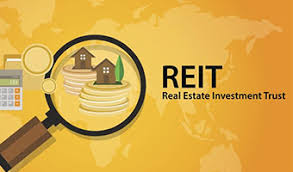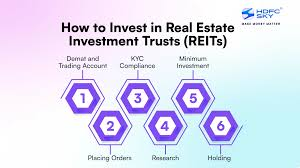Now Reading: REITs: The Easy Way to Invest in Real Estate Today 2025
-
01
REITs: The Easy Way to Invest in Real Estate Today 2025
REITs: The Easy Way to Invest in Real Estate Today 2025

Are you interested in investing in real estate but don’t have the money to buy a house or apartment? Real Estate Investment Trusts, or REITs, might be the perfect option for you. REITs allow you to earn money from real estate without owning any physical property. This beginner-friendly guide will explain what REITs are, how they work, and how you can start investing today.
What Is a REIT?

A REIT is a company that owns, operates, or finances real estate that produces income. These properties can include office buildings, shopping malls, apartments, hospitals, hotels, and warehouses. REITs collect rent or lease payments from tenants and then pay most of the income to shareholders as dividends.
The concept of REITs was created in the United States in 1960 to give everyday people a chance to invest in large-scale real estate projects. Today, REITs are traded on major stock exchanges, just like stocks.
Why Invest in REITs?
REITs offer many advantages, especially for new investors:
- Affordable Entry: You can start investing in REITs with as little as $10–$100.
- Liquidity: Publicly traded REITs can be bought and sold easily through a brokerage account.
- Diversification: REITs give you exposure to different types of real estate across various regions.
- Regular Income: REITs usually pay high dividends, providing a steady stream of income.
- No Landlord Duties: You don’t have to manage tenants, repairs, or paperwork.
Types of REITs You Can Invest In

There are several types of REITs. Here are the main categories:
- Equity REITs: These own and manage income-generating properties. Most REITs fall into this category.
- Mortgage REITs (mREITs): These provide loans or buy existing mortgages. They make money from the interest.
- Hybrid REITs: These combine equity and mortgage strategies.
- Private REITs: These are not publicly traded and often require higher investment amounts.
- Public Non-Traded REITs: These are registered with the SEC but not traded on exchanges. They’re less liquid.
For beginners, publicly traded equity REITs are usually the best option because they are easy to buy and sell.
Steps to Get Started with REITs

Here’s a simple step-by-step guide to help you begin your REIT investment journey:
1. Learn the Basics
Before investing, spend some time understanding how REITs work. Read articles, watch videos, and consider taking a beginner finance course if needed.
2. Open a Brokerage Account
To invest in publicly traded REITs, you need a brokerage account. Choose an online broker with low fees and easy-to-use tools. Examples include Fidelity, Charles Schwab, E*TRADE, and Robinhood.
3. Research REITs
Look into different REITs and compare their:
- Dividend yield (how much income you get)
- Total return (income plus growth)
- Property focus (commercial, residential, healthcare, etc.)
- Management team and performance history
You can find this information on financial websites like Yahoo Finance, Morningstar, or your broker’s platform.
4. Start Small
Begin with a small investment to test the waters. You can buy shares of individual REITs or choose REIT exchange-traded funds (ETFs) that include a mix of REITs. REIT ETFs help you diversify even more.
5. Monitor and Reinvest
Keep track of your REIT investments. Watch how the market moves and reinvest your dividends to grow your earnings over time. Some brokers offer automatic dividend reinvestment plans (DRIPs).
Common Risks of Investing in REITs
Like any investment, REITs come with risks:
- Market Volatility: REITs can go up or down in value with the stock market.
- Interest Rate Sensitivity: Rising interest rates can hurt REIT prices and their ability to borrow.
- Sector-Specific Risk: For example, hotel REITs may struggle during travel downturns.
- Liquidity (for non-traded REITs): Some REITs are hard to sell quickly.
To reduce these risks, diversify your investments and stick with reputable, well-established REITs.
Tips for REIT Beginners
- Start with REIT ETFs: These offer instant diversification and lower risk.
- Focus on dividends: Choose REITs with a strong record of paying consistent dividends.
- Avoid putting all your money in REITs: They should be part of a balanced portfolio.
- Use a retirement account: Consider holding REITs in an IRA to avoid taxes on dividends.
Top REITs to Watch in 2025
Here are a few popular REITs investors are watching this year (note: this is not financial advice):
- Realty Income (O): A favorite among income investors for its monthly dividends.
- American Tower (AMT): Specializes in cell towers—great for tech growth exposure.
- Prologis (PLD): Focuses on industrial properties and e-commerce warehouses.
- Vanguard Real Estate ETF (VNQ): A widely held REIT ETF offering broad exposure.
Final Thoughts
REITs are a smart way to begin investing in real estate without buying a property. They offer income, diversification, and easy access through the stock market. Whether you’re saving for retirement or just want to grow your money, REITs can be a valuable part of your investment plan.
Remember to start small, keep learning, and invest based on your personal goals and risk tolerance. With the right approach, REITs can be a reliable source of passive income and long-term growth.
Read more:- Shobha Realty Launches Its Most Luxurious Project Yet—Full Details Inside 2025






















